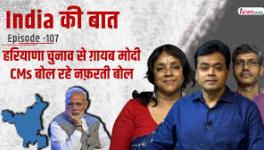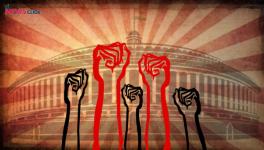Farmers’ Agitation: A Catch-22 Situation for Prime Minister Modi
What was intended to be a two-day protest on 26-27 November 2020 in Delhi has turned into a month-long protest on its borders. As it is turning into a nationwide protest with mass mobilisation, not only of farmers but of different classes of people, simmering discontent seems to have shed its ambivalence—as if it were just waiting for the opportune time.
At the outset, it must be made clear that the government of India is not entitled to enact laws in the field of agriculture, but it has been claiming that the three acts are connected with trading, which is a Union government subject. Right from the 1960s, the government of India has been fixing the Minimum Support Price (MSP) every year and procurement used to occur through Agriculture Produce Marketing Committees (APMCs). Yet, had the government been sincere when it enacted the three new laws, it would have first made MSP compulsory and APMCs essential for procurement of grains and other produce. Such an act would have quelled all fears. The terrible experience of farmers in Bihar due to their unprotected agricultural markets would have provided the necessary framework for guaranteeing MSP and making APMCs compulsory everywhere. But it was not to be.
Opening agricultural markets to private capital means a death warrant for farmers, even if the present farm laws had assured that the farmers’ land would not be taken from them. And, so far as the ruling party’s claim that APMCs are riddled with corruption is concerned, it can just be said that corruption is a national issue, to prevent which requires a different strategy in all walks of public life.
The farmers’ movement is now no longer confined to Punjab and Haryana as with each passing day more and more people are supporting it. It started in Punjab with rail traffic blockades and picketing at toll booths on highways, which continued for about two months. The movement was sparked in Punjab because some leaders, such as Balbir Singh Rajewal and Joginder Singh Ugrahan, have been actively involved in the Bharatiya Kisan Union (BKU) for a long time. Although there are numerous peasant organisations in Punjab and elsewhere, the unity seen among them today is unprecedented.
The most notable feature of their movement is that it is non-violent, and despite certain provocations, such as labelling them Khalistanis, Naxalites and agents of Pakistan and China, it has maintained its peaceful character. This has not happened for the first time in Punjab. The Akali movement for gurdwara reforms in 1920-1925 was a peaceful struggle and it took inspiration from Gandhi’s theory of non-violence. The movement culminated into the passing of the Gurdwara Act in 1925, which was hailed as a great victory and paved the way for the non-violent nationalist struggle. The Gandhian method of non-cooperation can be observed in the present movement also, as the people of Punjab have started boycotting the products of two corporate houses believed to be close to the Prime Minister.
The moment the farmers were grounded at the borders of Delhi, the question of utmost importance was whether they would be able to sustain their struggle for long, particularly in the light of the fact that they had intended to protest for two days, but the police barricades forced them to change their strategy. The question of sustaining their struggle, as well as survival for a longer period, came to the fore. Then happened the unexpected: they started getting local support and other farmers’ organisations began to join them. Food and other logistics got worked out and now they are in a position to continue their struggle for a considerable time.
In this context, the Sikh tradition of seva (service) worked for them. It should not be forgotten that even in some earlier protests, including the protest of farmers from Tamil Nadu and the Shaheen Bagh protest against the amended citizenship act, food was provided by gurdwaras in Delhi. Moreover, during the Covid-19 pandemic, Sikh gurdwaras offered food to every needy person, irrespective of religion and caste. When farmers from other states began to join them, the highways to Delhi got choked. Food and other needs that arise in extreme winter are continuously pouring in at their protest sites. What we have around Delhi now is a gathering of protesters at a scale that is unprecedented in the history of India.
Of late, the Bharatiya Janata Party, which is ruling at the Centre, has started to feel jittery about this protest. It has prepared a comprehensive plan to counter the farmers’ movement and immediately implemented it as well. Ruling-party leaders started organising rallies to put across to farmers how the new laws are beneficial to them. The Prime Minster has not missed any chance to mention the beneficial effects of the new laws either. On top of this, a section of media is spreading propaganda against the farmers’ movement. But gone are the days when the image of an Indian farmer was of a traditional-minded man (or woman) clad in “ethnic” clothes. The times have changed and the majority of farmers are now educated, and they are consumers of modernity too. The young and educated reacted to the media propaganda by starting their own newspaper, “Trolley Times”, and a YouTube channel, “Kisan Ekta Morcha”, and through these they have responded to every fake news being spread about their struggle.
Now to turn to the category of “politics”, which is continuously harped upon by the ruling party in general and the Prime Minister in particular. Strangely enough, when the Prime Minister says that the opposition parties are misleading farmers and indulging in politics, he seems to be forgetting that he, too, is a member of a political party and that his own party has engaged in similar actions. Owing to the domination of the pro-government media, the opposition parties do not get the needed press coverage, as a result of which there is a conscious effort to create a discourse around the “disappearance” of the opposition. This is not the case. The important thing to understand is that the leaders of the ongoing farmers’ movement are consciously keeping an equal distance from all political parties. So far, no political leader has been allowed to address farmers from their podiums.
With each passing day, the political fallout of this movement has started to emerge and become clearer: Government propaganda is being countered through tactical actions such as the offensive on social media as well as by using innovative methods of expressive actions. For example, on 27 December farmers appealed to people to clap and beat thalis at the time of the broadcast of “Mann ki Baat” by the Prime Minister. This appeal was quite extensively followed by people in Punjab and Haryana. The statement by the Prime Minister of Canada on how the farmers are peacefully protesting created quite a stir in India. There was also a statement by some Members of Parliament in the United Kingdom. The protest against farm laws has spread across the world, particularly in countries where there is a substantial presence of Indian diaspora. It is also being said that the United Nations has shown concern over what is happening in India.
In domestic politics, the BJP seems to be losing ground. It even seems that this movement may turn out to be the party’s Waterloo. A movement which began with opposition to the three new farm laws as its goal has extended its demands to the electricity bill as well as the law recently passed (as ordinance) to prevent stubble burning. Now, voices are being raised about Electronic Voting Machines and it will be no surprise if farmers soon demand paper ballots in future elections.
The Prime Minister is now in a Catch-22 situation, something which has never happened during the last over six years. Social psychologists inform us that there are two inseparable characteristics of a leader, which get identified by people of all cultures and nationalities. It is expected that a leader should be firm and also that he or she must be fair. Modi is showing firmness and this, for instance after the Pulwama incident in 2019, seemed to have paid dividends. But at the same time, Modi is trying to convince farmers that the farm laws are a fair deal for them and he wants them to get persuaded by his claim. And yet he is also demonstrating Pulwama-like firmness in response to their movement. He seems oblivious to the fact that when Francis Bacon v-believed that a yeoman makes the best soldier, it does not mean that this does not hold true for India! Here, too, it is the sons of farmers—with the exception of some states such as Gujarat which have no tradition of joining the military—who make up the soldiers as well as officers.
The way the farmers’ movement is continuing, it should give the government reason to worry. If the Prime Minister decides to accept the demands of the farmers, he would lose his image as a “firm leader”, the way it has been projected so far. But if he remains firm, then he will not be able to be fair. So, Modi can either be firm or fair. It is for the government to decide whether the country would be led to catastrophe or be saved from a future tragedy. Thus, the die has been cast.
The author is former professor of Sociology, Guru Nanak Dev University, Amritsar and president, Indian Sociological Society, New Delhi. The views are personal.
Get the latest reports & analysis with people's perspective on Protests, movements & deep analytical videos, discussions of the current affairs in your Telegram app. Subscribe to NewsClick's Telegram channel & get Real-Time updates on stories, as they get published on our website.
























